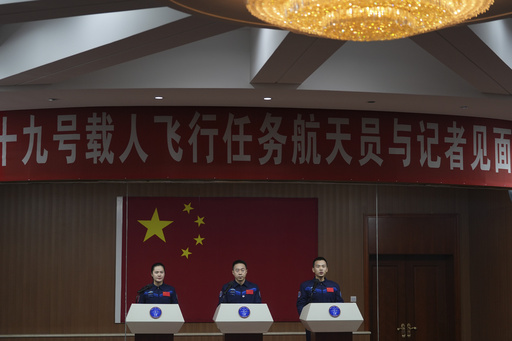
JIUQUAN, China — China has announced that it is fully prepared to launch its next crew to the Tiangong space station early Wednesday morning, marking another significant step in its ambitions to become a leading space power.
The crew consists of three astronauts: two men and one woman, who will take over from the current team that has been aboard the station for the past six months. The mission’s commander is Cai Xuzhe, who previously flew on the Shenzhou-14 mission in 2022. Joining him are Song Lingdong and Wang Haoze, both born in the 1990s and embarking on their first journey into space. Song has a background as an air force pilot, while Wang, serving as the payload specialist for the crew, is an engineer with the China Aerospace Science and Technology Corporation. Notably, Wang will be the third Chinese woman to participate in a crewed mission.
The three astronauts addressed the media during a brief news conference on Tuesday, standing behind protective glass. They expressed their commitment to executing scientific projects aboard the space station and emphasized their goal to “bring pride to the fatherland.” The Shenzhou-19 spacecraft, which will carry the trio, is scheduled to launch from the Jiuquan Satellite Launch Center in northwest China. The Long March-2F rocket, known for being the foundation of China’s human spaceflight endeavors, will be the launching vehicle. The launch is set to take place at 4:27 a.m., confirmed by Lin Xiqiang, the space agency’s spokesperson.
China developed its own space station after being barred from the International Space Station mainly due to U.S. concerns regarding the program’s management by the People’s Liberation Army, the military wing of the Chinese Communist Party. In addition to constructing the space station, China’s space agency has successfully landed a rover on Mars and has plans to send humans to the moon by 2030—an achievement that would position China as the second nation to accomplish such a feat, following the United States. China is also planning to establish a research station on the moon.
This lunar program is indicative of a rising competition with the United States—currently the leading nation in space exploration—as well as with countries like Japan and India. America is preparing to return astronauts to the moon for the first time in over half a century, although it recently postponed its target launch date to 2026.
During the upcoming mission, the Tiangong space station is expected to receive supplies from an uncrewed vessel, which will assist the crew in conducting spacewalks and performing maintenance tasks, including the installation and replacement of equipment designed to shield the station from space debris, a significant amount of which is attributed to China itself.
The mission is anticipated to conclude in late April or early May. Lin, the spokesperson, has indicated that there are contingency plans in place should the astronauts need to return earlier than expected.
Having launched its first crewed mission in 2003, China became the third country to achieve this milestone, following the Soviet Union and the United States. The Chinese space program has become a significant source of national pride and a showcase of the technological advancements the country has made over the past twenty years.
